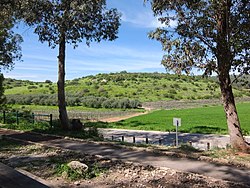
Back Judea Afrikaans Judäa ALS يهودا (منطقة) Arabic Xudea AST İudeya Azerbaijani یهودیه AZB Іўдзея Byelorussian Юдэя BE-X-OLD Юдея Bulgarian যিহূদিয়া Bengali/Bangla
Judea
יְהוּדָה | |
|---|---|
 | |
| Coordinates: 31°40′N 35°00′E / 31.667°N 35.000°E | |
| Location | Southern Levant |
| Part of | |
| Native name | יְהוּדָה |
| Highest elevation | 1,020 m or 3,350 ft |
Judea or Judaea (/dʒuːˈdiːə, dʒuːˈdeɪə/;[1] Hebrew: יהודה, Modern: Yəhūda, Tiberian: Yehūḏā; Greek: Ἰουδαία, Ioudaía; Latin: Iudaea) is a mountainous region of the Levant. Traditionally dominated by the city of Jerusalem, it is now part of Palestine and Israel. The name's usage is historic, having been used in antiquity and still into the present day; it originates from Yehudah, a Hebrew name. Yehudah was a son of Jacob, who was later given the name "Israel" and whose sons collectively headed the Twelve Tribes of Israel. Yehudah's progeny among the Israelites formed the Tribe of Judah, with whom the Kingdom of Judah is associated. Related nomenclature continued to be used under the rule of the Babylonians (the Yehud province), the Persians (the Yehud province), the Greeks (the Hasmonean Kingdom), and the Romans (the Herodian Kingdom and the Judaea province).[2] Under the Hasmoneans, the Herodians, and the Romans, the term was applied to an area larger than the historical region of Judea. In 132 CE, the Roman province of Judaea was merged with Galilee to form the enlarged province of Syria Palaestina.[3][4][5]
The term Judea was revived by the Israeli government in the 20th century, as part of the Israeli administrative district name "Judea and Samaria Area" for the territory that is generally referred to as the West Bank.[6]
- ^ "Definition of Judaea in English". Lexico Dictionaries. Archived from the original on 20 July 2021. Retrieved 20 July 2021.
- ^ Crotty, Robert Brian (2017). The Christian Survivor: How Roman Christianity Defeated Its Early Competitors. Springer. p. 25 f.n. 4. ISBN 9789811032141. Retrieved 28 September 2020.
The Babylonians translated the Hebrew name [Judah] into Aramaic as Yehud Medinata ('the province of Judah') or simply 'Yehud' and made it a new Babylonian province. This was inherited by the Persians. Under the Greeks, Yehud was translated as Judaea and this was taken over by the Romans. After the Jewish rebellion of 135 CE, the Romans renamed the area Syria Palaestina or simply Palestine. The area described by these land titles differed to some extent in the different periods.
- ^ Clouser, Gordon (2011). Jesus, Joshua, Yeshua of Nazareth Revised and Expanded. iUniverse. ISBN 978-1-4620-6121-1.
- ^ Spolsky, Bernard (27 March 2014). The Languages of the Jews: A Sociolinguistic History. Cambridge University Press. ISBN 978-1-107-05544-5.
- ^ Brand, Chad; Mitchell, Eric; Staff, Holman Reference Editorial (2015). Holman Illustrated Bible Dictionary. B&H Publishing Group. ISBN 978-0-8054-9935-3.
- ^ Neil Caplan (19 September 2011). The Israel-Palestine Conflict: Contested Histories. John Wiley & Sons. p. 8. ISBN 978-1405175395.
© MMXXIII Rich X Search. We shall prevail. All rights reserved. Rich X Search